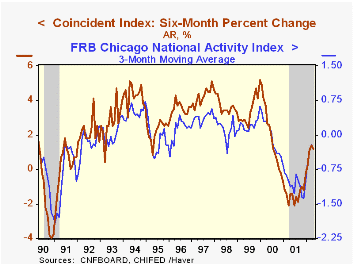 Global| Sep 23 2002
Global| Sep 23 2002Leading Indicators Down For Third Month
by:Tom Moeller
|in:Economy in Brief
Summary
The Composite Index of Leading Economic Indicators, reported by the Conference Board, fell as expected last month. It was the third decline in as many months and the fourth decline in the last five. July figures were revised to show [...]

The Composite Index of Leading Economic Indicators, reported by the Conference Board, fell as expected last month. It was the third decline in as many months and the fourth decline in the last five. July figures were revised to show less of a decline versus the previously reported 0.4% decline.
Only 30% of the leaders' component series rose last month versus 50% that rose in July and June. It was the weakest breadth-of-gain since September and pulled the six-month diffusion index to 55%. Higher claims for jobless insurance, weaker vendor performance, lower orders for capital goods and a narrower yield curve had the largest negative influences on the leading index. Stock prices and the money supply rose.
The ratio of coincident-to-lagging indicators rose, reversing all of a July decline. The ratio is an indicator of excess relative to actual economic performance.
The coincident indicators rose for the sixth consecutive month and the six-month rate of change was a positive 1.2%. The lagging indicators resumed a decline that began in late 2000. The lagging index is down 7.3% since its peak.
The Leading index is based on eight previously reported economic data series and two that are estimated.
| Business Cycle Indicators | Aug | July | Y/Y | 2001 | 2000 | 1999 |
|---|---|---|---|---|---|---|
| Leading | -0.2% | -0.1% | 2.0% | -0.7% | 1.1% | 3.3% |
| Coincident | 0.1% | 0.0% | 0.1% | -0.5% | 3.4% | 3.2% |
| Lagging | -0.1% | 0.2% | -3.8% | -1.3% | 2.8% | 1.8% |
Tom Moeller
AuthorMore in Author Profile »Prior to joining Haver Analytics in 2000, Mr. Moeller worked as the Economist at Chancellor Capital Management from 1985 to 1999. There, he developed comprehensive economic forecasts and interpreted economic data for equity and fixed income portfolio managers. Also at Chancellor, Mr. Moeller worked as an equity analyst and was responsible for researching and rating companies in the economically sensitive automobile and housing industries for investment in Chancellor’s equity portfolio. Prior to joining Chancellor, Mr. Moeller was an Economist at Citibank from 1979 to 1984. He also analyzed pricing behavior in the metals industry for the Council on Wage and Price Stability in Washington, D.C. In 1999, Mr. Moeller received the award for most accurate forecast from the Forecasters' Club of New York. From 1990 to 1992 he was President of the New York Association for Business Economists. Mr. Moeller earned an M.B.A. in Finance from Fordham University, where he graduated in 1987. He holds a Bachelor of Arts in Economics from George Washington University.






